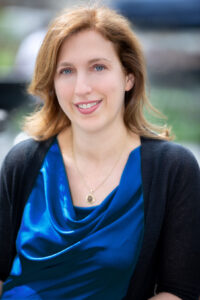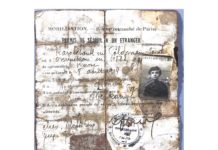
Elliot King is a professor and the chair of the Department of Communication and Media at Loyola University Maryland. The university is a private Jesuit institution affiliated with the Catholic Church, and it is not known as a hub for Jewish students.
Which, King said, makes it all the more important that, on Oct. 21, Loyola is hosting award-winning Jewish author Dara Horn for its annual Jerome S. Cardin Memorial Lecture, where she will discuss her book “People Love Dead Jews: Reports from a Haunted Past,” and what life is like for Jews today.
“We never had a Jewish student organization at Loyola; there just weren’t enough Jewish students to really justify it,” King said. “Then, post-Oct. 7, the campus ministry worked to organize Jewish students so that they had a place where they could talk to each other at Loyola. There might have been 25 people at the meeting, of whom more than half were not Jewish, but they were there as allies. That is not happening on a lot of other campuses, where there’s this outpouring of support from non-Jewish people for their Jewish classmates.”
Horn’s book discusses the dynamic of many people studying figures like Anne Frank, whom she calls “everybody’s second-favorite dead Jew,” while simultaneously not respecting modern Jewish culture, or even shirking their responsibility to combat today’s antisemitism.
King and some of his colleagues read the book and decided that it carries ideas that need to be shared.
“We said, ‘This is a message that would be good to hear, especially now,’” he said.
The Cardin lecture has been held at Loyola since 1986, with the goal of exploring a variety of topics relevant to Judaism and Christianity, especially within the relationship between followers of the two religions.
King said that the book, which is a collection of essays, takes a critical look at how the world sees Jews and the problem with just looking backwards at all that Jews have done in society.
“I’d say the main point of the book is the way society looks at Jews — over the last 50 years, very laudatory about all the wonderful accomplishments we have, but that attitude is basically retrospective. It’s looking back at Jewish achievement, and in the present, there is a lot of antisemitism,” King said. “Looking back in that way masks the current level of antisemitism in the United States and in the world.”
King said that the problems run deeper than just the way in which society praises Jews, something he has seen firsthand as an educator. He cited Shakespeare’s “The Merchant of Venice” as an example. The play is often taught in Shakespeare lessons, something that Horn identified as an issue in her book, too.

“‘The Merchant of Venice’ is an antisemitic play — there’s no way around it. They excuse it away and say, ‘Oh, he’s reflecting the attitudes of his time.’ But they don’t have to pick ‘The Merchant of Venice’ to teach kids Shakespeare. They could pick ‘Romeo and Juliet,’ or ‘Hamlet’ or ‘A Midsummer Night’s Dream,’” King said.
Horn comes to Loyola with a host of awards under her belt. She is the recipient of two National Jewish Book awards, the Edward Lewis Wallant Award, the Harold U. Ribalow Award and the Reform Judaism Fiction Prize. She was a finalist for the JW Wingate Prize, the Simpson Family Literary Prize and the Carnegie Medal for Excellence in Fiction.
Her nonfiction works have been published in Tablet, where she is a regular columnist, as well as The New York Times, The Wall Street Journal, The Washington Post, The Atlantic, Smithsonian and The Jewish Review of Books.
At first glance, Loyola University may seem like an odd host for this conversation. But King said it is emblematic of the institution’s purpose and ideals.
“Loyola is still a place where differences can be discussed in even-keeled, appropriate ways,” he said.
The lecture is free and open to the public, and King hopes that it will be well attended by people from all backgrounds.
“People Love Dead Jews” was published in 2021 and has made waves in the Jewish community and beyond since then, and King said he thinks that the conversation later this month will be a successful one.
“It’s a testament to the idea that there is still potential for values-based places to have these kinds of conversations,” he said.


